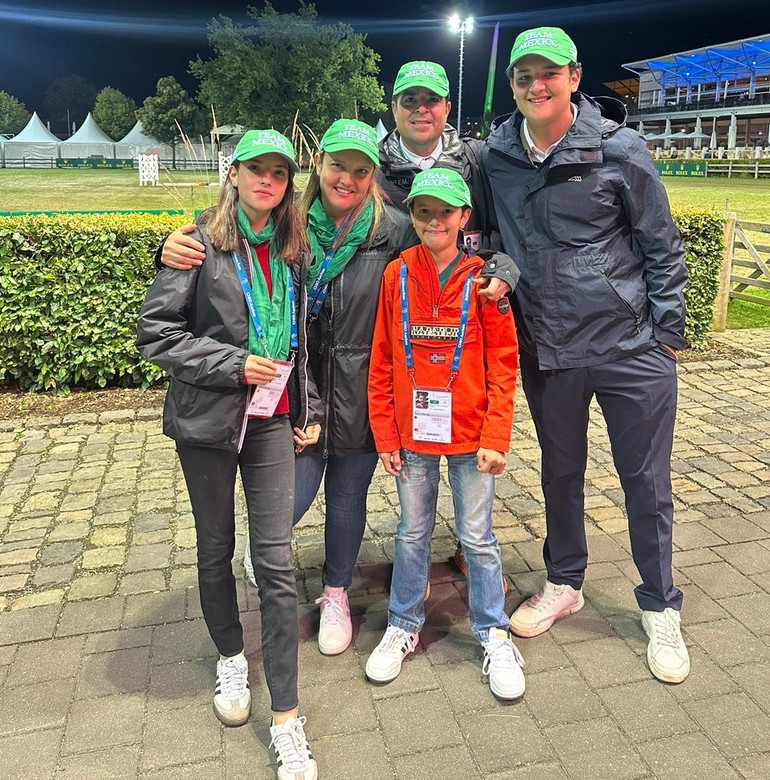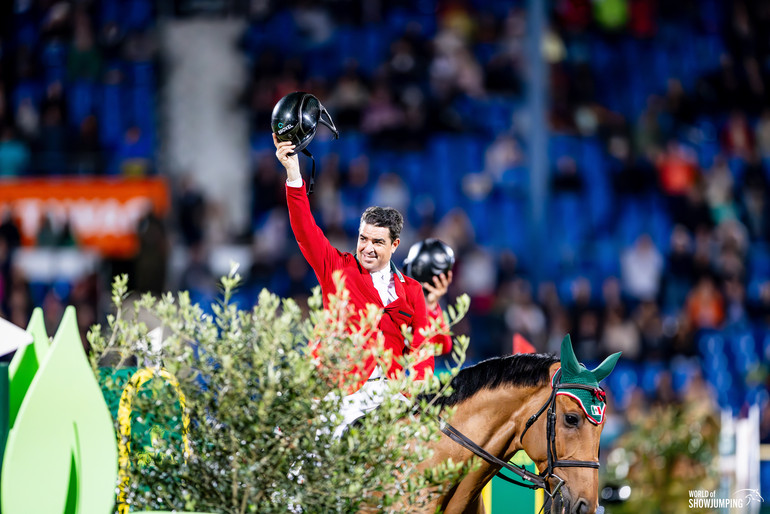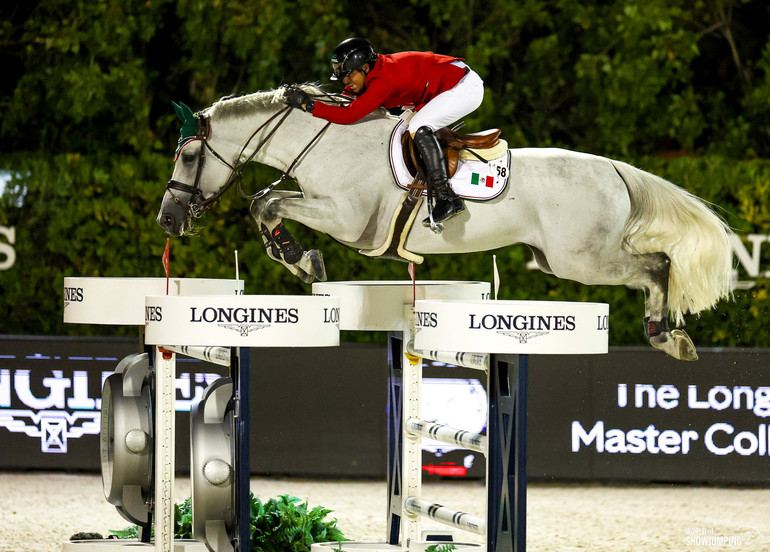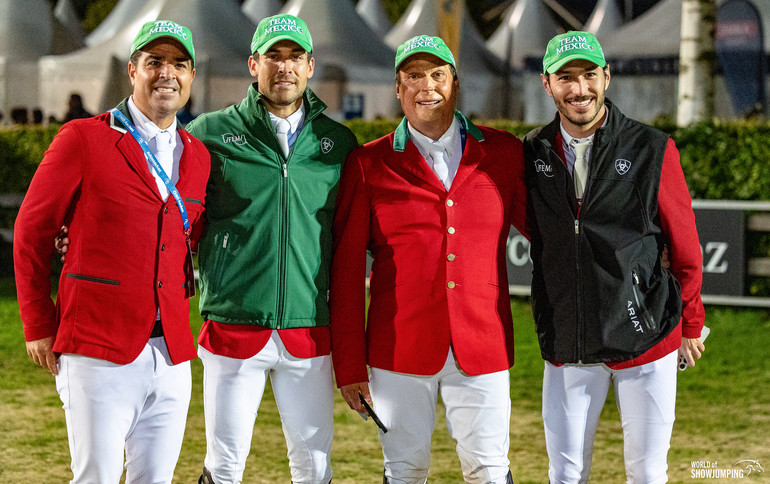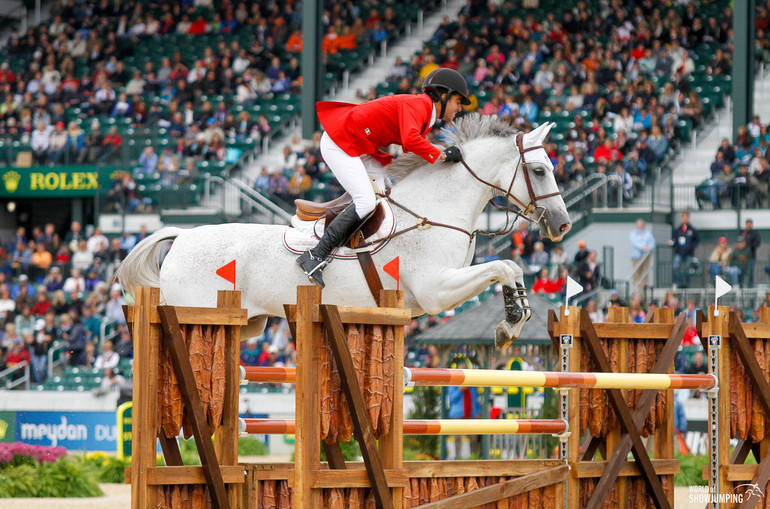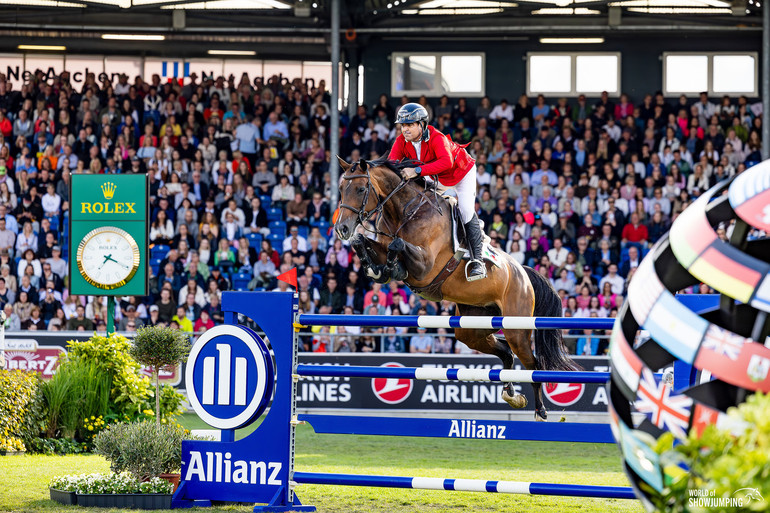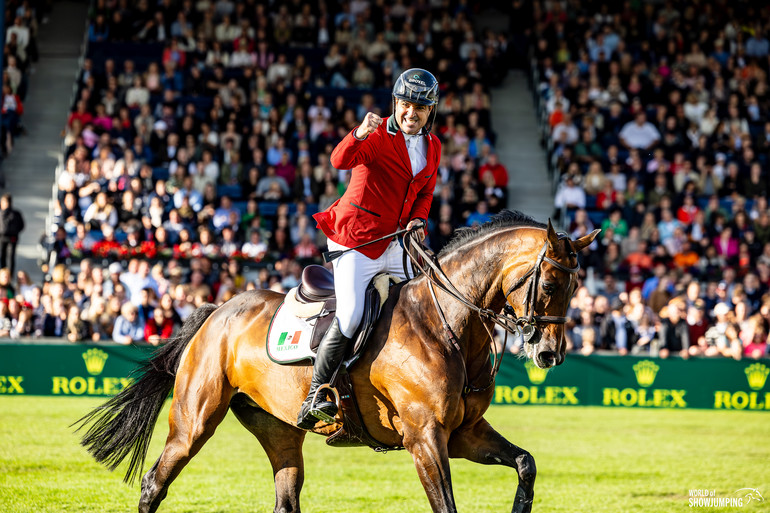 “Paris put aside, I think I have accomplished everything I have dreamed about,” Mexico's Nicolas Pizarro says as he looks back at his career. Here after this year's clear round in the Mercedes-Benz Nations Cup at CHIO Aachen with the wonderful Pia Contra. Photo © Jenny Abrahamsson for World of Showjumping.
“Paris put aside, I think I have accomplished everything I have dreamed about,” Mexico's Nicolas Pizarro says as he looks back at his career. Here after this year's clear round in the Mercedes-Benz Nations Cup at CHIO Aachen with the wonderful Pia Contra. Photo © Jenny Abrahamsson for World of Showjumping.
Text © World of Showjumping
Riding the wonderful 13-year-old mare Pia Contra (Conthargos x Chacco-Blue), Nicolas Pizarro was the best Mexican rider in the team competition at the 2023 Pan American Games in Santiago, Chile, helping his country clinch one of the last three qualifying spots for the 2024 Olympic Games.
Nine months after their double clear performance in the team competition at the Pan American Games, and a day after Mexico’s historical 2nd place finish in the Mercedes-Benz Nations Cup at CHIO Aachen – where Nicolas jumped clear in round one – the 45-year-old learned that he had not made the Mexican team for Paris. A bitter pill to swallow for Nicolas, who has put in a tremendous amount of hard work over the last years to become Mexico’s highest ranked rider in the world; he currently sits 66th on the Longines Ranking, after having recorded his lifetime best as rank 29 back at the end of 2023. However, what made it even harder was that Nicolas was dreaming of the Olympics being the last championship performance for him and his mare before they would return to Mexico, where Nicolas plans to shift his focus towards coaching and his own family obligations.
However, despite not making it to Paris, Nicolas has no regrets – he chooses to be grateful for all the opportunities he has created through dedication and hard work. “Paris put aside, I think I have accomplished everything I have dreamed about,” Nicolas says as he looks back at his career. “I did everything on my bucket list. The last years, I worked really hard to be high on the ranking because that was my only way to get to do all these shows I was dreaming of before I would stop riding at top level. Now I won’t go into retirement saying I missed out on something.”
“This is the time for me to give back to my sport what it has given to me,” Nicolas says. “I really love teaching the same way I love training the horses. My main focus will now be my students, and I will also continue to develop young horses and keep on showing in Mexico,” he explains.
“While we as horse people and riders don't see what we do in our international careers as a sacrifice, it’s perhaps a bit different for those closest to us – the families – with all the travelling and all the pressure that comes with competing at this level. Now, my kids are 18, 14 and 12, and I would like to be able to be a bit more at home with them,” Nicolas points out.
Working his way up
“I always had a very special connection with horses,” Nicolas tells. “I started riding so early on that I don't have the memory of when exactly. I just don’t remember anything else than riding, but I must have been three or four years old the first time I rode – on Spanish horses at my grandmother’s breeding farm.”
As he got older, Nicolas’s love for the horses grew. Every day after he finished school, he would go to ride. “And sometimes even before going to school,” he smiles.
However, when Nicolas was twelve, his parents decided to send him to school in Texas, USA, where he stayed for 1.5 years. “When I came back to Mexico my dad made arrangements so I could try a jumping horse. He wanted to keep me away from the Spanish horses as they were linked to the Mexican bull-fighting scene, which he was adamant I should not get involved in,” Nicolas explains. “To this day I still remember the adrenaline when I made my first jump. It was amazing! So, at 14 I started my career in jumping and from there I never stopped – now I'm 45.”
During his last year in high school, Nicolas met his wife Rocio – who has played an instrumental part in his career. “She had nothing to do with horses,” Nicolas explains. “Nevertheless, she has supported me through it all. Together with the very important support of our partners we have built up our business and stables”.
The Nations Cups will always be the way forward
“For me, it has been important to have a performance career at the very highest level so that my clients had confidence in me and that I could teach them – that’s why I also wanted to become the best ranked Mexican rider in the world,” Nicolas points out.
During his career, Nicolas has jumped at the most beautiful shows in the world; Aachen, Barcelona, Calgary, Dinard, Dublin, Mexico City, as well as at the Olympic Games in London, the list goes on – he’s been there and done that. However, he’s quick to point out that what he loves the most are the Nations Cups. “For me, the Nations Cups are something really special,” he says. “The Nations Cups help build structure and a team. They give you teammates – you no longer compete only as an individual. The Nations Cups also give you that process where you can prepare yourself for championships. So, I think in whichever format the FEI finds it to be the best in the constant evolution of the sport, we should always see the Nations Cups as the way forward.”
Nicolas’ love for the Nations Cups also made the Mexicans’ historical second-place finish in the Mercedes-Benz Nations Cup of Aachen this summer even more special. “I would call it a magical night. I think it was a dream come true for the four riders on the team, and for the country,” Nicolas says. “It was something truly amazing, and even more so to me personally because I made a special commitment to myself when I first came to Aachen in 2006 for the World Equestrian Games. That’s when I together with my family made a decision to go for a high-performance career at the very top.”
Mexican commitment
“We have had very nice support from the Mexican Federation. I think they have done something fantastic, not only with developing a really good show circuit in Mexico, but also with their high-performance program,” Nicolas says about how the Mexicans have become a force to be reckoned with on the international showjumping scene. “We now have access to a chef d’equipe, a vet, a psychologist – we can really get the support needed to work professionally. It’s the reason you see Mexican riders competing all around the globe and doing it in a very nice way.”
“The show organizers have also made a tremendous commitment in Mexico, and that was the only way forward to put the level up; through high-quality international shows with very good course designers, at amazing venues,” he points out.
Unique horses
Throughout his career, Nicolas has had many special horses that have helped him reach the level he’s at today. “Prince David was the first horse to really put me into the sport, back when I was a junior,” he tells. “He taught me how to ride a big horse, a strong horse, a European horse. Being in Mexico, I was more used to very light horses, a little bit Latin-thoroughbred, so he introduced me to something different.”
“After the World Equestrian Games in 2006, I started to look for very unique horses – I understood that I really needed to have an amazing companion for the big sport. So, then came Nilvio – that I had in partnership with the VDL Stud – and Quilombo LS from La Silla,” Nicolas tells.
“However, it was meeting Joseph Klaphake that made a big impact on my life,” Nicolas says. “Through him, I got a collaboration with Paul Schockemöhle – and for many years, I only rode horses from them. That’s when I got Crossing Jordan who I jumped the Olympics with in 2012, and also Jerminal En Noir who I did my first five-star Nations Cups with. Skylubet and Colasko also came to me from Schockemöhle.”
“Pia Contra came to me from Schockemöhle when she was five,” Nicolas tells. “We made an amazing match, and she came to me in the minute that I had the experience to understand her. What she does not have from nature though is scope; but she weighs up for that through her brave heart, by being careful and a real fighter. Pia jumps out of her heart and not out of her body. That’s why she has been able to jump in any ring anywhere in the world, from Aachen to Monaco. And that’s also why she kept on jumping her heart out in the Nations Cup in Aachen after losing a shoe in the landing after the first fence in the second round; she just never gives up.”
“Pia is sensitive, and always in need of being close to her groom and me as her rider. She likes being touched, being taken care of. She's such a fighter, there's nothing she cannot do – she always gives her best, and in return she asks for respect,” Nicolas says.
“Pia’s co-owner and I have always thought she is an amazing horse, capable of answering all questions asked of her. She is so special to me, she gave me so much, and she deserves the best life,” Nicolas says.
“I still do not know the exact plan for her future; probably a little bit of breeding, or to be the teacher for a good rider who is willing to jump into the big leagues, but always in the most respectful way,” Nicolas says.
“I also need to thank Ariana Azcarraga, for giving me her experienced horses to ride – Atlantica and Enkidu – they have also been a very special part of my career, of my heart and my life book,” Nicolas adds.
“I find myself really lucky and really, really grateful. I have been able to develop some very nice horses from when they were young, taking them to Grand Prix level, it’s been a fantastic process and for sure this would never have been possible without a big team and my family behind me. It would have been impossible to go around the world without their support,” Nicolas points out.
Be open
Looking towards the future, Nicolas believes that the international showjumping community has an important job to do. “As riders, we should not be afraid of being accessible and easy to reach; we should be open – show that we have nothing to hide,” he says.
“I think it's very important that we make the outside world understand that our horses are really given the best possible care,” he continues. “We have to show that we are the companions of the horses, and that in order to achieve any kind of success we as humans have to adapt and understand them. As a good horseman, everything you do is built on the respect for the horses; I don't follow the idea of only winning and putting all your darts towards the trophy.”
“If you look at any successful rider, none of their life stories would have been possible without our biggest athletes – the horses,” Nicolas says. “The horses will always remain the most important and everything we do should be focused on them.”
17.9.2024 No reproduction of any of the content in this article will be accepted without a written permission, all rights reserved © World of Showjumping.com. If copyright violations occur, a penalty fee will apply.



